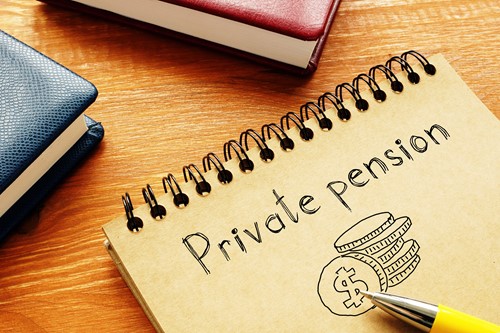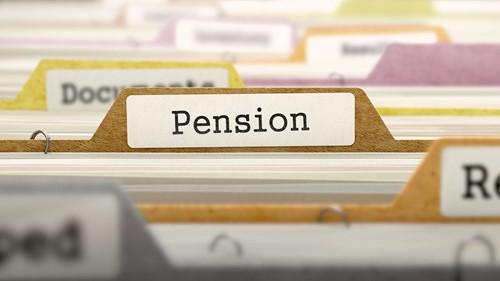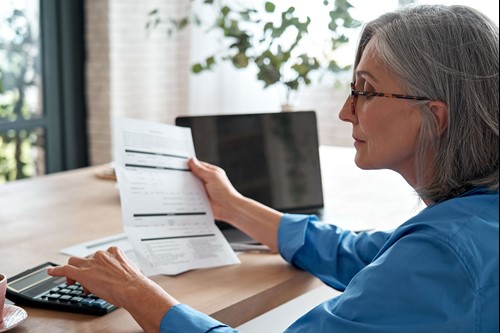A private pension, or personal pension plan, is a money-saving scheme that can be used by your employees once they’ve retired.
As an employer, you must enrol your employees on a pension scheme and make contributions, if your employees are eligible.
For immediate advice, get in touch with one of Croner’s experts here.

What is a private pension?
The term private pension covers an employee's workplace pension and their personal pension. These are an effective way for an employee to save for retirement.
Private pensions are sometimes known as defined contribution pensions (DC). The amount an employee ends up with depends on how much they've paid over the lifetime of the pension.
What is a defined contribution pension?
A defined contribution pension is the process of building up a pension pot over time. This type of pension will go towards an employee's retirement income and is made up of employee and employer contributions.

What is a defined benefit pension pot?
The defined benefit pension can also pay an employee's retirement income. This is based on the employee's salary and on how long they've worked for a company.
Typically these are only available on public sector and older workplace pensions.
Types of pensions
There are different types of pensions that an employee can have, we've listed a few of them below.
Workplace pensions
A workplace pension is usually a pension that is arranged by an employer. They can vary from employer to employer.
This may be the contributions added by the employer or the employee, or the employer may offer a salary-sacrificing scheme.

Personal pension
A personal pension is also known as a defined contribution pension scheme. The main difference is the employee or individual will find their own pension provider and decide;
- How they are going to contribute.
- How much they are contributing, which can depend on their individual circumstances.
The age in which the pension can be taken out is set by the individual but isn't usually before the age of 55.
Personal pensions are a great idea for those who don't have workplace pensions (such as if they are self-employed), as they are a tax-efficient way of saving for the future.
State pension
A state pension is a pension that employees (and employers) can claim when they reach the state pension age.
The maximum someone can claim is £203.85 a week (£10,600.20 per year), unless they have reached the state pension age before 6th April 2016.
How much someone would receive is worked out on their working history and their national insurance (NI) contributions, and income tax.

Stakeholder pensions
Stakeholder pensions aren't as complex as they sound. They're a type of personal pension that has a low minimum contribution, capped charges and a small number of investment options.
These are handy if an individual doesn't want to make investment decisions yet, but wants a one size fits all investing option.
Self-Invested personal pensions (SIPPS)
A self-invested personal pension is for an individual who wants a wide range of investment options.
Individuals have more power in where their money is invested and can manage their investment portfolio.
It's important to remember that whatever money you invest, you may get less back later on.
Do I Need to Set Up A Private Pension Scheme for My Employees?
No. As a business owner, you don't need to do anything about your employees' private pensions. A person sets up their personal pension on their own.
Of course, you do need to set up a workplace pension scheme for your staff.

How Does it Work?
A personal pension scheme works by you making either (or both) one-off payments or monthly contributions into the pension.
When you begin setting up your personal pension, you will have a range of pension funds from which to choose.
These will vary depending on how much risk you're willing to take in your investments. You can invest your money into assets including:
- Cash
- Property
- Bonds
- Shares
This list isn't exhaustive.

When Can an employee take a pension out?
The ripe age of 55 is currently when you can start taking out your pension, but this isn't stated in law, as we've mentioned in a personal pension, the individual chooses when. If the pension is take out before the age of 55, then the individual may be subject to significant tax charges. When you reach 55, you have a few options with your private pension:
- Use it to buy an annuity. This is a guaranteed income for a fixed term. There are different kinds of annuities. Make sure you read about the different options available.
- Take out your private pension as a lump sum.
- Leave your pension in the plan to continue investing—the value could still go up or down. You can still withdraw cash amounts when you need them.

Is There Tax on A Private Pension?
You'll be glad to know that you get tax relief on a private pension when you make your payments. The provider will claim the tax back and adds it to the pension pot.
With the standard rate of tax relief at 20%, essentially it looks like this: Let's say you pay £4,000 into your pension during a year.
HMRC will add £1,000, which is of course 20% of £5,000. However, rates may vary for people who pay a higher tax rate.
Furthermore, if your employee is an "additional rate" taxpayer, they can claim 25% extra pension tax relief.
Can employees set up private pensions even though they already have a workplace pension?
Of course, they can.
Moreover, in fact, in an ideal world, everyone would do so. By having a private pension in addition to a workplace pension and State Pension, employees have more saved earnings to draw from when they get to 55, or whenever they decide to retire after that.
The State Pension currently provides a maximum of £8,546 per year.
This is a good start, but it might not be enough to live on. Therefore, it's seriously worth thinking about what the future version of yourself will use to pay for weekly amenities, like lunch with the grandkids or a round of drinks after golf with friends.
Employers can utilise pension schemes to help boost employee retention and attract more talent to their businesses.

Talk to an Expert
There are lots of pension providers. Choosing the best private pension scheme isn't something you should do hastily. If you need any advice, get in touch with one of Croner's experts.
Croner has a team of award-winning HR consultants who are specialists in their field. We've been helping businesses for over 80 years and our advice line is open 365 days a year, 24 hours a day. Why not speak to a Croner expert on 0808 145 3375
Related resources
Categories
- Business Advice
- Contracts & Documentation
- Culture & Performance
- Disciplinary & Grievances
- Dismissals & Conduct
- Employee Conduct
- Employment Law
- End of Contract
- Equality & Discrimination
- Health & Safety
- Hiring & Managing
- Leave & Absence
- Managing Health & Safety
- Moving
- Occupational Health
- Pay & Benefits
- Recruitment
- Risk & Welfare

